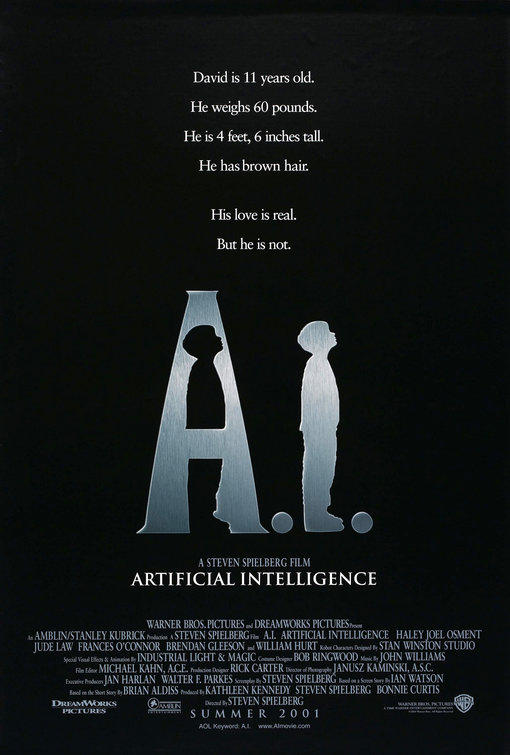
Viewing the film A.I. in class brought up so many issues within my mind that I cannot even begin to expand upon here.
One of the issues that I thought was interesting is when the android Joe explains to David why some of the humans hate the mechas so much. I thought his quote here was fascinating.
Joe speaks about Monica to David: "She loves what you do for her, as my customers love what it is I do for them. But she does not love you David, she cannot love you. You are neither flesh, nor blood. You are not a dog, a cat, or a canary. You were designed and built specific, like the rest of us. And you are alone now only because they tired of you, or replaced you with a younger model, or were displeased with something you said, or broke. They made us too smart, too quick, and too many. We are suffering for the mistakes they made because when the end comes, all that will be left is us. That's why they hate us, and that is why you must stay here, with me."
To me, this is a fascinating prospect, to think that humans are jealous that something under them, something created by them can live on forever, but they themselves cannot.
One of the other fascinating things is that David will not die, nor will he grow old. If taken into a family, the family will not get the same experience as having their own child. What happens when they die, where will David be at 11 years old continuously? Furthermore, the parents are not getting the typical parenting experience because David is flawless in his love. These ideas will present in Lyotard's writing. Professor Hobby states that David will be "Always loving, never ill, never changing. With all the childless couples yearning in vain for a license our Mecha will not only open up a new market but fill a great human need." Will he really fulfill a human need though that only a real child could fulfill?
Simply being able to experience love and dreams does not suffice for being real. David will never be a real boy, as he was created by man and not God. David does not have a soul, nor can he die.
I have sympathy on him in the film, due to the way in which he is portrayed and the way in which the terrible flesh fairs are shown. My concern is the same as I expressed several entries ago. Yes, the people are only destroying machines...but the way in which they treat a human-looking machine could be reflected onto the way in which other real humans are treated.
The movie does tend to play upon our sympathies, especially when David goes into Professor Hobby's headquarters and sees hundreds of other Davids exactly like himself. David realizes that Professor Hobby was only manipulating him to test him in his ability to love and dream like a real boy. It is really, very sad to see.
Another interesting quote is what a female colleague says to Professor Hobby:
"If a robot could genuinely love a person, what responsibility does that person hold toward that mecha in return? It's a moral question, isn't it?" Professor Hobby responds, "The oldest one of all. But in the beginning, didn't God create Adam to love him?" In response to this, yes, God created Adam to love Him, but God created Adam so that man could share in God's eternal love-live and be one with Him according to man's free will. This, however, is to make man fulfilled, not God. God needs nothing from us to be sustained. Furthermore, man has something that robots don't have: human dignity at being created by God in the image and likeness of God. Man has a soul and free will. Robots will never have any of these in their entirety.
Another issue in the film is that when David visits Dr. Know, the search engine cannot come up with his answer alone, which involved fantasy and reality. This idea of search engines being limited comes up in Dreyfus' writing. The machine had to be tampered with first. In turn, technology will always be limited in the idea that it doesn't have common sense. It cannot read our minds for what we are looking for exactly.
In conclusion: Yes, David gets part of his wish in the end, but not exactly the happy ending that Pinocchio's story had. He will never be a real boy. There will always be that gap between fantasy and reality for David. Who would've known that the story of Pinocchio would have such a far-reaching message into the future? I certainly didn't!
No comments:
Post a Comment